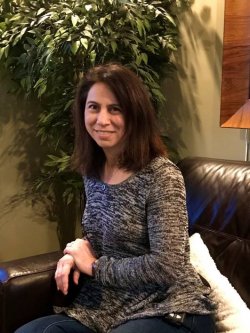You could say that, for Dr Sari Cooper, medicine is in her blood. Her experiences as a young girl while her brother, who is hemophiliac, was in and out of hospital for treatments, and then her family’s firsthand experience with the tainted blood scandal, left a life-long impression. The hospital waiting room, and connecting with doctors and nurses, became an integral part of her growing up years. “It was really scary for my family, from the ages of 12 to 17, we did not know whether he had contracted HIV,” said Dr Cooper. (He was one of the fortunate few hemophiliacs who did not contract HIV, though he did struggle with Hepatitis C for decades before receiving a successful course of treatment.)

Then, at 12 years of age, Sari was diagnosed with diabetes, something that would shape the rest of her life. That combined with her brother’s experiences, contributed to her decision as an adult to study medicine. “I remember my interactions with the health care system were very positive. There was a lot of encouragement from my family to move in that direction.”
At first, Dr Cooper thought about training in psychiatry, but she opted for family medicine because she realized she really wanted to provide care in a broad range of issues, and counselling and mental health care would still be a large part of her practice. Her experience with diabetes has shaped the way she cares for her patients, providing her with a unique perspective and empathy for the challenges they face.
“[The diabetes] is always there, you can’t put it down. And I think that that more than anything has allowed me to understand chronic disease from the patient perspective. I’ve sat in both chairs.”
Connection and building trust, says Dr Cooper, are central to patient care. “When you get a health care provider that understands the other side, that has 100% informed the kind of doctor I am, that has created who I am as a clinician.”
Moving from individual patient care to influencing system change
Dr Cooper is one of the newest members of the General Practice Services Committee. When she applied, she had no expectation of actually being selected, because she did not have a wealth of leadership experience. What she does have is passion for the profession, and a desire to help fix the health care system at the provincial level.
“When I see very elderly patients in walk-in clinics, and I see physicians being asked to take on more and more patients with complex challenges, and spending hours on paperwork and administrative tasks instead of direct patient care…and then watching family physicians be undervalued…it is infuriating watching that…living it.”
She brings a fresh perspective to the committee, and is committed to supporting real change. “I’m the grassroots, I’m the person on the ground. Your regular day-to-day family doctor in the trenches.”
So far, she says, serving on the GPSC has been an incredible experience, although she was terrified at first. “I could not be more impressed by the people that I am sitting with from all sides. It’s quite remarkable and inspiring that the right people are at the table. So that was part of my fear, do I really want to get involved in something that it could be pretty awful and it’s not, it’s been fantastic.”
Dr Coopers third passion – being creative through writing
When she isn’t practicing medicine and serving on the GPSC, Dr Cooper embraces her other passion – her writing. She is the published author of the novel, The Horse of the River. It is a middle-school-age adventure story based on her experiences horseback riding and rafting in New Zealand, which included some harrowing experiences.
Not surprisingly, ”the main character is a very strong young girl. She has a lot of resilience and while she gets some help along the way, she does a lot of the rescuing herself.” The young girl’s parents are, also not surprisingly, both doctors. “Basically I wrote it for my kids, I never expected it to be published,” said Dr Cooper. “It’s a fictionalized version of our family, people reading it are getting to know my family a little bit.”
Still, don’t expect writing to become a full-time career. Dr Cooper remains committed to her work as a physician – both with her patients and in helping to shape change in primary care.
“I believe wholeheartedly in family medicine. I believe it is, or at least it should be, the best specialty there is.”
